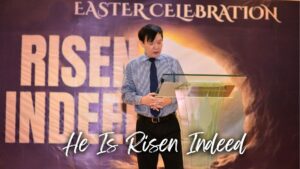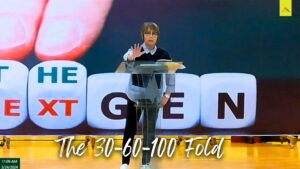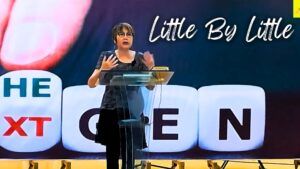Title: Rebuilding and Refurbishing the Temple of God
Haggai 1:1-12
In the second year of Darius the king, in the sixth month, in the first day of the month, came the word of the Lord by Haggai the prophet unto Zerubbabel the son of Shealtiel, governor of Judah, and to Joshua the son of Josedech, the high priest, saying,
2 Thus speaketh the Lord of hosts, saying, This people say, The time is not come, the time that the Lord’s house should be built.
3 Then came the word of the Lord by Haggai the prophet, saying,
4 Is it time for you, O ye, to dwell in your cieled houses, and this house lie waste?
5 Now therefore thus saith the Lord of hosts; Consider your ways.
6 Ye have sown much, and bring in little; ye eat, but ye have not enough; ye drink, but ye are not filled with drink; ye clothe you, but there is none warm; and he that earneth wages earneth wages to put it into a bag with holes.
7 Thus saith the Lord of hosts; Consider your ways.
8 Go up to the mountain, and bring wood, and build the house; and I will take pleasure in it, and I will be glorified, saith the Lord.
9 Ye looked for much, and, lo it came to little; and when ye brought it home, I did blow upon it. Why? saith the Lord of hosts. Because of mine house that is waste, and ye run every man unto his own house.
10 Therefore the heaven over you is stayed from dew, and the earth is stayed from her fruit.
11 And I called for a drought upon the land, and upon the mountains, and upon the corn, and upon the new wine, and upon the oil, and upon that which the ground bringeth forth, and upon men, and upon cattle, and upon all the labor of the hands.
12 Then Zerubbabel the son of Shealtiel, and Joshua the son of Josedech, the high priest, with all the remnant of the people, obeyed the voice of the Lord their God, and the words of Haggai the prophet, as the Lord their God had sent him, and the people did fear before the Lord.
The Theme of Haggai
The Prophet Haggai is the prophet of the returned remnant
Haggai was God’s messenger. The expression, ‘Thus saith the Lord’ characterized his message. We will find all the way through this little book that Haggai repeatedly refers to the Word of the Lord
Haggai not only rebuked the people; he also cheered and encouraged them in marvelous ways.
Haggai not only preached, he also practiced
The theme of Haggai is the temple.
The reconstruction and refurbishing of the temple were the supreme position of the Prophet Haggai.
YHWH will take care of you when you take care of the House of God:
- Family
- Health
- Protection
- Your own house
- Your secret legitimate desires
Haggai constantly referred to the Word of the LORD as the supreme authority. The building of the temple is a command from the word of God. The phrase ‘the word of the LORD’, found in Haggai 1:1 is repeated to give more effect to the LORD’s answer to the lame excuses for inaction when it comes to rebuilding the house of God
What can we learn from this portion of scripture?
- Challenge to the people
Haggai 1:2-3
2 Thus speaketh the Lord of hosts, saying, This people say, The time is not come, the time that the Lord’s house should be built.
3 Then came the word of the Lord by Haggai the prophet, saying,
Haggai challenged and encouraged the people to rebuild the temple. Please understand that the Israelites had gone through gigantic obstacles which required herculean effort and hardships. After they had gone through a period like that, there were discouraged when they began to build the temple. The difficulties seemed insurmountable. Therefore, they rationalized and decided that it was not the time to build
Then God spoke in Haggai 1:2 ‘Thus speaketh the LORD of hosts, saying This people say ‘The time is not come, the time that the LORD’s house should be built.’
Here it reflects an excuse that the people were giving, either verbally or by their inactivity, for not rebuilding the Temple.
- Challenge to their conscience
Haggai 1:3-4 says, ‘Then came the word of the LORD by Haggai the prophet, saying, ‘Is it time for you, O ye, to dwell in your ceiled houses, and this house lie waste?
Haggai appealed to their consciences. To Paraphrase, Haggai said, ‘You can make yourselves comfortable; you have time and means and expertise to expand on your own private interests, and can you look with indifference on the house of God lying waste?’The meaning here is, these folk who said it was not time to build the Lord’s house had built their own house – it seem the time to build their house had arrived, but not the LORD’s house.
The term ‘ceiled houses’ means wainscoted and roofed with costly woods, perhaps with the very cedar provided for the rebuilding of the temple. In the Septuagint, the Hebrew word means ‘your vaulted houses’ or as Saint Cyril explains, ‘houses whose doorposts were elaborately adorned with emblems and devices’.
David was convicted with this and he said, ‘I dwell in an house of Cedar, but the Ark of God (temple) dwelleth within curtains.’
To many folks who said it was not time to build the LORD’s house had all built their own houses – it seemed the time to do that. It was time to build their house but not the LORD’s house. And the LORD pointed that that their houses were ‘ceiled houses’. This means that they were beautifully paneled; they were luxuriously built
- Challenge to their ways
Haggai 1:5-9
5 Now therefore thus saith the Lord of hosts; Consider your ways.
6 Ye have sown much, and bring in little; ye eat, but ye have not enough; ye drink, but ye are not filled with drink; ye clothe you, but there is none warm; and he that earneth wages earneth wages to put it into a bag with holes.
7 Thus saith the Lord of hosts; Consider your ways.
8 Go up to the mountain, and bring wood, and build the house; and I will take pleasure in it, and I will be glorified, saith the Lord.
9 Ye looked for much, and, lo it came to little; and when ye brought it home, I did blow upon it. Why? saith the Lord of hosts. Because of mine house that is waste, and ye run every man unto his own house.
For the people of Israel there had been crop failure. There had been famine. There had been little money to buy clothes or food, and they had no savings account. But they never once attributed this to their disobedience. They were trying to explain it in other ways.
Difficulties come to you for a purpose. God will not let anything happened to you unless it has a purpose. God is trying to develop something valuable in our heart and life. That is why God said, ‘consider your ways.’ Man’s ways always seem right to him. The writer of the Book of Proverbs says in Proverbs 14:12 ‘There is a way, which seemeth right unto a man, but the end thereof are the ways of death.’
To consider is literally to set your heart upon. Upon what? Upon your ways. Your ways is what you have done, what you have suffered, your present projects and the consequences thereof. You see, their labors for years past had lacked the Divine blessing. Though they had fine houses to dwell in, they had been visited with scanty harvests and weak bodily health. They have sown much and bring in little. And these unfruitful seasons had visited them during all the continuance of their negligence of the house of God.
Sometimes our excuses sound so logical and legitimate. God wants me to give attention to things at home – home comes first. My family comes first. My children’s future comes first
Bible commentator Aiden says, ‘Many Christians are like those ancient Hebrews, somehow convincing themselves that we have to be economical in constructing church buildings is all important, but still did not contribute but spare no expenses in acquiring their own luxuries.
To break this curse, they are to go up to the mountain, found in verse 8 by their own exertions to procure material for the building. The mountain has reference to wood.
What happened when we do that? YHWH will be glorified and the curse will be broken. YHWH will glorify himself by showering blessing son the house and the people. So that the people of God themselves and their neighbors (foreigners, outsiders) may recognize that YHWH is among them.





